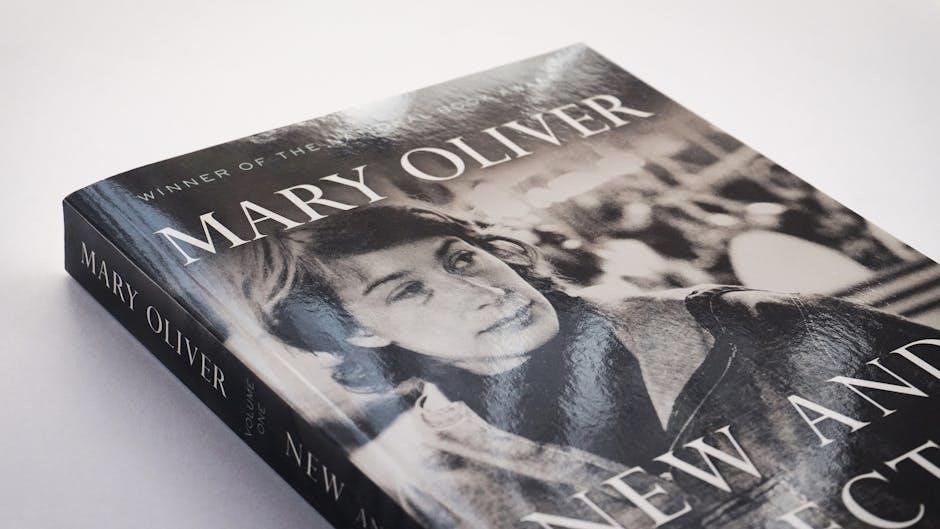the poet x full book pdf
Elizabeth Acevedo’s The Poet X is a lyrical novel-in-verse that captures the journey of Xiomara Batista, a young Dominican-American girl navigating identity, culture, and self-discovery in Harlem.
Overview of the Novel
The Poet X is a compelling coming-of-age novel-in-verse by Elizabeth Acevedo, telling the story of Xiomara Batista, a 15-year-old Dominican-American girl growing up in Harlem. Struggling with her identity, family expectations, and cultural traditions, Xiomara finds solace in poetry, which becomes her voice for self-expression and empowerment. The novel explores themes of identity, family dynamics, and societal constraints, offering a raw and emotional portrayal of adolescence. Through vivid imagery and powerful verse, Acevedo captures Xiomara’s journey of discovering her voice and asserting her place in the world.
Author Background: Elizabeth Acevedo
Elizabeth Acevedo is a Dominican-American poet, novelist, and slam poet known for her powerful storytelling and lyrical voice. Born and raised in New York City, Acevedo draws inspiration from her Latinx heritage and experiences growing up in Harlem. Before becoming a full-time writer, she worked as a high school teacher, which influenced her commitment to representing diverse voices in literature. Her debut novel, The Poet X, was inspired by her own journey of self-discovery and won the 2018 National Book Award, solidifying her reputation as a groundbreaking author in young adult literature.
Genre and Style: Novel-in-Verse
The Poet X is a contemporary young adult novel written in verse, blending poetic lyricism with a compelling narrative. This unique format mirrors the slam poetry that shapes Xiomara’s journey, creating a rhythmic and intimate storytelling experience. The use of free verse allows for raw emotional expression, drawing readers into Xiomara’s inner world. Acevedo’s choice of style emphasizes themes of identity, self-discovery, and empowerment, making the novel both a literary achievement and a deeply personal exploration of voice and resilience.

Themes and Motifs in “The Poet X”
The novel explores identity, empowerment, and self-expression, delving into cultural expectations, family dynamics, and religious influences. Slam poetry emerges as a motif, symbolizing liberation and voice.
Identity and Self-Discovery
Xiomara Batista’s journey in The Poet X is a profound exploration of identity and self-discovery. As a young Dominican-American girl in Harlem, she grapples with her cultural heritage and personal aspirations, often finding herself at odds with her mother’s traditional expectations. Through her poetry, Xiomara navigates her evolving sense of self, embracing her uniqueness and challenging societal norms. Her growth is marked by moments of vulnerability and strength, as she learns to voice her truths and assert her place in the world. This theme resonates deeply, offering a powerful message about the importance of self-acceptance and authenticity.
Family Dynamics and Cultural Expectations

In The Poet X, family dynamics and cultural expectations play a central role in shaping Xiomara’s experiences. Her mother’s strict adherence to traditional Dominican values and Catholic beliefs creates tension, as Xiomara struggles to reconcile these expectations with her own desires and identity. The novel highlights the generational and cultural gaps between Xiomara and her parents, particularly her mother, who imposes rigid notions of femininity and duty. These conflicts fuel Xiomara’s internal battles and her quest for autonomy, as she seeks to carve out her own path while navigating the weight of her heritage.
Religion and Spirituality
Religion and spirituality are significant themes in The Poet X, as Xiomara grapples with her mother’s strict Catholic beliefs and her own doubts about faith. The novel portrays the tension between traditional religious expectations and personal spiritual exploration. Xiomara’s discomfort in church and her questioning of religious teachings reflect her growing independence and desire for self-definition. Through her poetry, she seeks to reconcile her cultural heritage with her evolving beliefs, ultimately finding a form of spirituality that aligns with her authentic self rather than societal or familial pressures.
Empowerment Through Poetry
Poetry serves as Xiomara’s primary tool for empowerment in The Poet X. Through her verses, she expresses emotions and thoughts she cannot vocalize aloud, transforming her silence into strength. Slam poetry becomes her outlet, allowing her to challenge societal and familial constraints. By embracing her voice, Xiomara gains confidence and learns to assert her identity. Poetry not only liberates her but also connects her to a community that values self-expression, highlighting its power to inspire change and foster resilience. This journey underscores the transformative impact of poetry on personal and collective empowerment.

Protagonist Analysis
Xiomara Batista’s journey in The Poet X is one of self-discovery and growth, as she finds her voice through poetry and builds a supportive community around her.
Xiomara Batista: Character Development
Xiomara Batista evolves from a reserved, conflicted teenager into a confident young woman who embraces her identity. Her journey is marked by struggles with her mother’s expectations and societal pressures. Through poetry, she finds solace and a medium to express her thoughts, transforming her voice into a powerful tool of self-expression. Her development is gradual, reflecting the challenges and breakthroughs of adolescence, ultimately leading her to assert her place in the world with courage and authenticity.
Internal Conflicts and Growth
Xiomara grapples with internal conflicts, including her desire for autonomy, her changing body, and her mother’s strict Catholicism. She struggles with feelings of resentment and guilt, particularly toward her mother, while navigating her own identity. Through poetry, she begins to process these emotions, finding a voice to express her truths. Her growth is evident as she learns to embrace her body, question societal norms, and seek independence. This journey of self-reflection and empowerment highlights her transformation from a conflicted teenager to a confident individual, ready to assert her place in the world.
Relationships and Support Systems
Xiomara finds support in her relationships, particularly with her twin brother Xavier and her friends, who encourage her to explore her passion for poetry. Her friendship with Chris and mentorship by Ms. Galiano provide safe spaces for her to express herself. However, her relationship with her mother is strained due to cultural and generational differences. Despite this, Xiomara learns to navigate these complexities, finding strength in her community and peers. These relationships play a pivotal role in her growth, helping her build confidence and assert her identity in a world where she often feels silenced.

Setting and Atmosphere
Set in Harlem, the novel vividly portrays a culturally rich, dynamic neighborhood that shapes Xiomara’s experiences and emotions, serving as both backdrop and character in her journey.
Harlem as a Character in the Novel
Harlem emerges as a vibrant, living character in The Poet X, its streets, stoops, and culture shaping Xiomara’s identity and voice. The neighborhood’s dynamic rhythm and rich history provide a backdrop for her growth, influencing her poetry and self-discovery. Through vivid descriptions, Acevedo personifies Harlem, making it a central figure that mirrors Xiomara’s inner world—its energy, beauty, and challenges reflecting her own journey of empowerment and understanding. This setting becomes integral to her story, offering both inspiration and context for her evolving perspective.
Cultural and Social Context
The Poet X is deeply rooted in the cultural and social fabric of Xiomara’s Dominican heritage and her Harlem community. The novel explores tensions between traditional values and modern identity, particularly through Xiomara’s struggles with her mother’s expectations. Themes of race, gender, and class are interwoven, reflecting the broader experiences of marginalized communities. Acevedo’s portrayal of these elements creates a rich tapestry, offering readers a nuanced understanding of the societal forces shaping Xiomara’s world. This context not only grounds her story but also amplifies its universal themes of resilience and self-discovery.

Structure and Literary Devices
Written in verse, The Poet X uses poetry as a narrative device, blending lyrical language with raw emotion to convey Xiomara’s journey. This structure mirrors her growth, creating an intimate and authentic voice that resonates deeply.
The Use of Poetry as a Narrative Device
In The Poet X, Elizabeth Acevedo employs poetry as a narrative device to convey Xiomara’s innermost thoughts and emotions. The verse format allows for a fluid, personal storytelling style, where each poem serves as a chapter, blending lyrical language with raw emotion. This structure mirrors Xiomara’s growth, creating an intimate and authentic voice. The poems capture her struggles with identity, family, and culture, offering a powerful exploration of self-discovery. The use of poetry not only reflects Xiomara’s passion but also amplifies the novel’s themes, making it a unique and impactful reading experience.
Symbolism and Imagery
In The Poet X, Acevedo uses vivid imagery and symbolism to enrich the narrative. Xiomara’s body and voice serve as symbols of empowerment, while her stoop becomes a space of observation and reflection. Imagery of Harlem’s vibrant streets and cultural richness underscores her connection to her heritage. Religious symbols, like the Virgin Mary, contrast with Xiomara’s growing questioning of tradition. These elements weave together to create a layered exploration of identity, culture, and self-expression, highlighting Xiomara’s journey toward reclaiming her voice and embracing her true self.

Key Plot Points
Xiomara discovers slam poetry, joins a club, and performs, overcoming her fears. Her relationships evolve, and she gains confidence, finding her voice amid family and cultural challenges.
The Journey of Discovering Slam Poetry
Xiomara’s journey begins when she discovers slam poetry through her school’s club. Initially hesitant, she finds solace in the raw, emotional power of spoken word. Her first performance, inspired by her frustrations with societal expectations, marks a turning point. Slam poetry becomes her outlet, allowing her to express feelings she cannot voice aloud. As she gains confidence, Xiomara embraces this art form, finding a sense of belonging and empowerment. Her journey highlights the transformative power of poetry in navigating identity, culture, and self-discovery, ultimately helping her claim her voice and challenge societal norms.
Challenges and Breakthroughs
Xiomara faces numerous challenges, including her mother’s rigid expectations, cultural pressures, and self-doubt. Her journey is marked by struggles with identity and societal constraints. However, her discovery of slam poetry becomes a breakthrough. Through this art form, she finds the courage to express her true self, challenging the limitations imposed on her. Poetry becomes her liberation, allowing her to reclaim her voice and assert her independence. This transformation highlights her resilience and growth, as she learns to embrace her uniqueness and stand against oppressive norms, ultimately finding empowerment and self-acceptance through her words.

Reception and Impact
The Poet X received widespread acclaim, winning the National Book Award and becoming a New York Times bestseller. Its raw, poetic voice resonated deeply with readers, sparking conversations about identity, culture, and empowerment, solidifying its place as a modern classic in young adult literature.
Awards and Critical Acclaim
Elizabeth Acevedo’s The Poet X garnered significant recognition, winning the 2018 National Book Award for Young People’s Literature. It also became a New York Times bestseller, praised for its powerful narrative and lyrical prose. Critics lauded the novel for its authentic portrayal of identity, culture, and self-discovery, resonating with readers globally. The book’s success highlighted Acevedo’s unique voice and skill in blending poetry with storytelling, earning it a place among contemporary literary classics. Its acclaim continues to grow, with educators and readers alike celebrating its impact on young adult literature.
Reader Response and Popularity

The Poet X has resonated deeply with readers, earning a 4.7-star rating on Amazon and over 22,000 reviews. Fans of Jacqueline Woodson, Meg Medina, and Jason Reynolds praise its relatable themes and vivid storytelling. The novel’s popularity stems from its authentic portrayal of identity, culture, and self-discovery, making it a favorite among young adult readers. Its inclusion in the PBS NewsHour and New York Times book club further boosted its reach. Readers appreciate its raw emotion and empowering message, solidifying its place as a contemporary classic in young adult literature.

The Poet X is a powerful exploration of identity, culture, and self-discovery through poetry, leaving a lasting impact on readers and literature.
Legacy of “The Poet X”
Elizabeth Acevedo’s The Poet X has left an indelible mark on young adult literature. Winning the National Book Award and becoming a New York Times bestseller, it has inspired countless readers to embrace their identities. The novel’s unique verse format and raw storytelling have resonated globally, making it a staple in discussions about empowerment and self-expression. Its impact extends beyond the page, fostering a new wave of diverse voices in literature and poetry.
Final Thoughts on the Novel’s Significance
The Poet X stands as a testament to the power of self-expression and cultural identity. Acevedo’s vivid portrayal of Xiomara’s journey resonates deeply, offering readers a mirror to their own struggles and aspirations. The novel’s exploration of family, religion, and societal expectations underscores its relevance in contemporary discussions. By giving voice to marginalized experiences, The Poet X not only reflects the world but also challenges it, leaving a lasting impact on the literary landscape and inspiring future generations of writers and readers alike.
